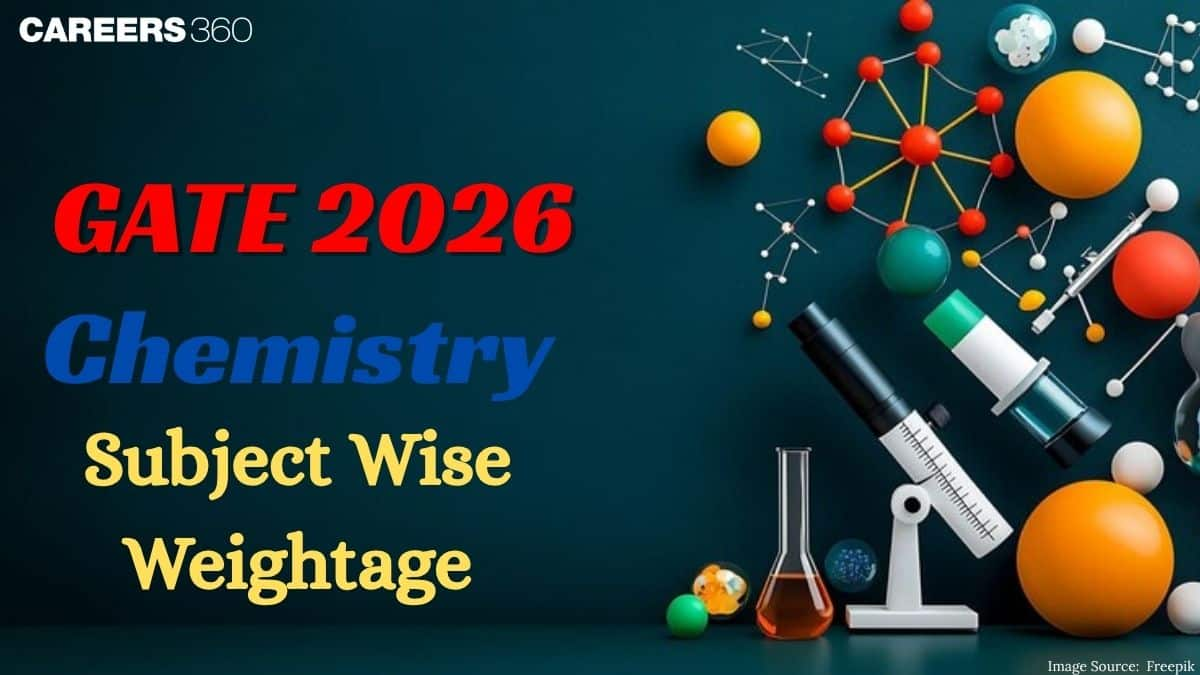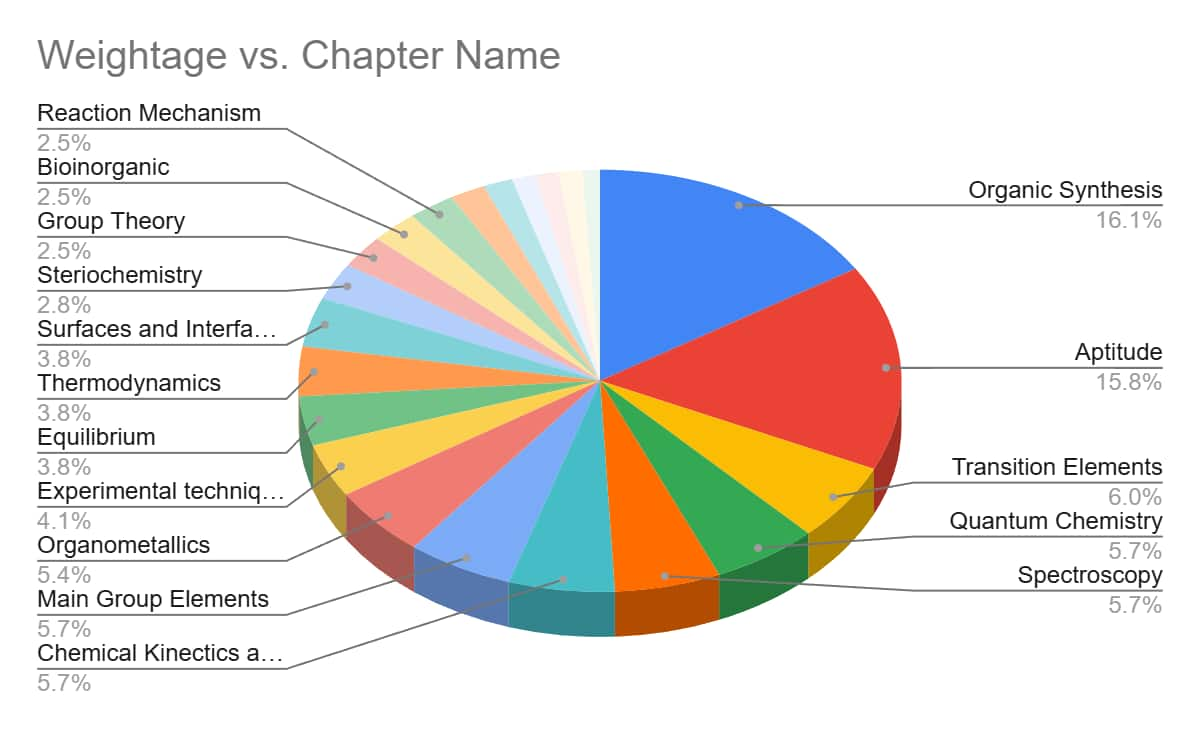UPES M.Tech Admissions 2026
Ranked #45 Among Universities in India by NIRF | 1950+ Students Placed 91% Placement, 800+ Recruiters
GATE Chemistry Subject Wise Weightage 2026: As a GATE aspirant, you must also be looking for GATE chemistry subject wise weightage 2026! This is the right place and look no further. GATE 2026 will be conducted by IIT Guwahati on February 7, 8, 14 and 15, 2026. GATE is a highly competitive national level exam. Preparation for this exam has to be done with proper research and thorough revisions. In some cases, the weightages may even differ slightly, but the overall distribution is normally uniform. Getting conversant with the GATE Chemistry Chapter Wise Weightage 2025 is helpful since its mastery can work wonders Let's go through the important details of weightage and kick start your preparation for GATE 2026.

The GATE Chemistry Subject Wise Weightage 2026 consists of a vast syllabus area of Chemistry discipline. The table below will provide you with the last 5 years subject wise weightage from 2021 to 2025. The overall weightage percentage is also given:
| Chapter Name | 2025 | 2024 | 2023 | 2022 | 2021 | Total 5 year | Weightage |
| Organic Synthesis | 7 | 9 | 12 | 14 | 9 | 51 | 16.19% |
| Aptitude | 10 | 10 | 10 | 10 | 10 | 50 | 15.87% |
| Transition Elements | 4 | 5 | 4 | 1 | 5 | 19 | 6.03% |
| Quantum Chemistry | 5 | 4 | 3 | 4 | 2 | 18 | 5.71% |
| Spectroscopy | 3 | 3 | 2 | 4 | 6 | 18 | 5.71% |
| Chemical Kinectics and Electrochemistry | 2 | 3 | 6 | 3 | 4 | 18 | 5.71% |
| Main Group Elements | 5 | 3 | 4 | 3 | 3 | 18 | 5.71% |
| Organometallics | 5 | 3 | 5 | 2 | 2 | 17 | 5.40% |
| Experimental techniques of organic chemistry | 3 | 3 | 3 | 3 | 1 | 13 | 4.13% |
| Equilibrium | 2 | 3 | 2 | 2 | 3 | 12 | 3.81% |
| Thermodynamics | 3 | 2 | 1 | 2 | 4 | 12 | 3.81% |
| Surfaces and Interfaces | 2 | 3 | 3 | 3 | 1 | 12 | 3.81% |
| Steriochemistry | 2 | 3 | 2 | 1 | 1 | 9 | 2.86% |
| Group Theory | 1 | 2 | 1 | 3 | 1 | 8 | 2.54% |
| Bioinorganic | 1 | 1 | 2 | 3 | 1 | 8 | 2.54% |
| Reaction Mechanism | 3 | 2 | 2 | 1 | 0 | 8 | 2.54% |
| Instrumental Method of Analysis | 1 | 3 | 0 | 2 | 0 | 6 | 1.90% |
| Solids | 2 | 1 | 1 | 1 | 0 | 5 | 1.59% |
| Lanthanoids and Actinoids | 0 | 0 | 2 | 1 | 1 | 4 | 1.27% |
| Pericyclic and Photochemistry | 1 | 1 | 1 | 1 | 0 | 4 | 1.27% |
| Biomolecules | 2 | 1 | 0 | 1 | 0 | 4 | 1.27% |
| Radioactivity | 1 | 0 | 1 | 0 | 1 | 3 | 0.95% |
| Total | 65 | 65 | 65 | 65 | 55 | 315 | 100.00% |
Also check: GATE Chemistry Syllabus 2025
The following GATE Chemistry Topic Wise Weightage 2026 impacts your preparation strategy. A visual representation graph is given below to understand which subjects holds how much weightage. Organic Synthesis has the highest weightage of 16.1% followed by Aptitude (10 questions every year).

This table will give you the weightage of the GATE 2025 exam:
| Chapter Name | Number of Questions |
| Organic Synthesis | 7 |
| Aptitude | 10 |
| Transition Elements | 4 |
| Quantum Chemistry | 5 |
| Spectroscopy | 3 |
| Chemical Kinectics and Electrochemistry | 2 |
| Main Group Elements | 5 |
| Organometallics | 5 |
| Experimental techniques of organic chemistry | 3 |
| Equilibrium | 2 |
| Thermodynamics | 3 |
| Surfaces and Interfaces | 2 |
| Steriochemistry | 2 |
| Group Theory | 1 |
| Bioinorganic | 1 |
| Reaction Mechanism | 3 |
| Instrumental Method of Analysis | 1 |
| Solids | 2 |
| Lanthanoids and Actinoids | 0 |
| Pericyclic and Photochemistry | 1 |
| Biomolecules | 2 |
| Radioactivity | 1 |
| Total | 65 |
Based on the past years GATE Chemistry exam, the topics with highest weightage is given below:
| Category | Topics |
| Physical Chemistry | Atomic Structure & Quantum Chemistry, Thermodynamics & Statistical Thermodynamics, Electrochemistry, Equilibria, Kinetics, Surface Chemistry, Polymer Chemistry, Group Theory, Solid State |
| Inorganic Chemistry | Coordination Chemistry, Organometallic Compounds, Main Group Elements, Radioactivity & Nuclear Chemistry, Chemical Bonding, Analytical Chemistry, Instrumental Methods, Bioinorganic Chemistry |
| Organic Chemistry | Reaction Mechanism, Organic Synthesis, Spectroscopy, Pericyclic Reactions, Photochemistry, Heterocyclic Chemistry, Stereochemistry |
Top Books according to GATE Chemistry Subject Wise Weightage 2026
| Branch | Book Title & Author(s) | Description / Usefulness | |
|---|---|---|---|
| Physical Chemistry | Physical Chemistry – Peter Atkins & Julio de Paula | Comprehensive source of fundamental principles and current topics. | |
| Physical Chemistry | Physical Chemistry for the Chemical Sciences – Raymond Chang | Simple explanations and problems for revising basic concepts. | |
| Organic Chemistry | Organic Chemistry – Clayden, Greeves & Warren | Detailed descriptions of reactions and mechanisms; highly praised. | |
| Organic Chemistry | Organic Chemistry – Morrison & Boyd | Classic text; good grounding in concepts and methodologies. | |
| Inorganic Chemistry | Inorganic Chemistry – Miessler, Fischer & Tarr | Concise explanation of coordination, bioinorganic, and other topics. | |
| Inorganic Chemistry | Concise Inorganic Chemistry – J.D. Lee | Brief, accurate information; strong conceptual base for exams. |
Frequently Asked Questions (FAQs)
The GATE Chemistry exam scheduled in 2026 is also expected to have a similar structure. It will likely consist of 65 questions divided into two sections: Chemistry (CY) and General Aptitude (GA). The course has a GA section of 10 questions totalling 15 marks, while the CY section has 55 questions worth 85 marks, together making it a total of 100 marks. The types of questions asked in the exam generally include MCQ, MSQ and NAT type questions, they largely vary from question to question. Questions in MCQs and MSQs may carry negative marking for incorrect answers while questions in NAT questions do not. The exam is expected to take 3 hours and will be in a computer based format.
While the exact weightage can vary slightly each year, based on recent trends, the GATE Chemistry Subject Wise Weightage 2025 is:
Physical Chemistry: 35-40%
Inorganic Chemistry: 25-30%
Organic Chemistry: 25-30%
A comprehensive preparation strategy for GATE Chemistry 2026 should include:
Syllabus mastery, Concept-focused learning,Problem-solving practice, and Time management.
On Question asked by student community
The cutoff marks for OBC category students are different for different paper codes. You can check the article on Gate cutoff for all the detailed information. Hope it helps.
IIT Guwahati has released GATE exam ME answer key in online mode. Here we have provided direct link to download IIT Guwahati Mechanical Engineering answer key.- Download Here
Students can download the ebooks from the link given below.
The official GATE 2026 Shift 2 (Feb 8) answer key was released by IIT Guwahati on February 22, 2026, on the GOAPS portal.
Check out the GATE 2026 February 8 Question Paper with Solutions .
Hi Raj, please check the link for GATE Agricultural Engineering question paper 2026 to know about the syllabus and the topic covered.
Among top 100 Universities Globally in the Times Higher Education (THE) Interdisciplinary Science Rankings 2026
Apply for UG & PG programs from Victoria University, Delhi NCR Campus
NAAC A+ Accredited | Among top 2% Universities Globally (QS World University Rankings 2026)
Ranked #45 Among Universities in India by NIRF | 1950+ Students Placed 91% Placement, 800+ Recruiters
NAAC A+ Accredited | Scholarships worth 5 CR
1st in NPTEL program of 6 IITs | Highest CTC 72 LPA | Scholarships to meritorious students